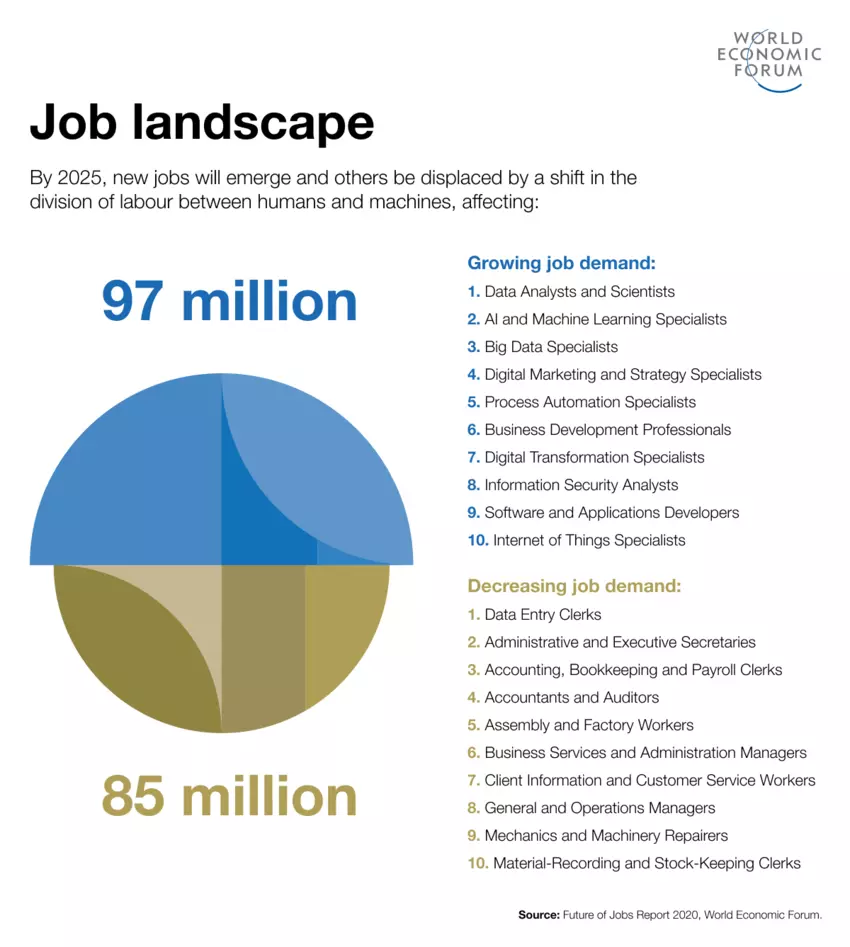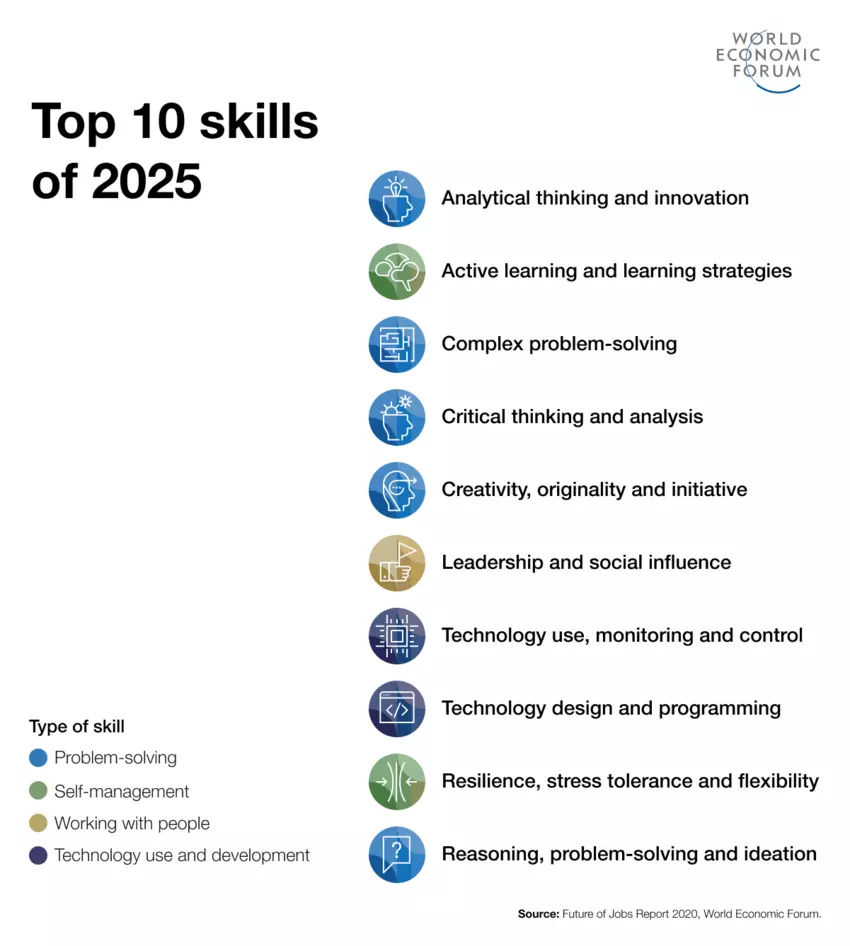When I grow up…
What do you want to be when you grow up?
It’s an age-old question almost every child is asked to ponder at one time or another. Some of the more popular responses will no doubt always make the list. From firefighter to teacher, pop star to ballerina…these are often the go-to professions many young imaginations are drawn to. Although some of these ‘dream jobs’ might currently be vying for pole position alongside newer professions such as gamer, YouTuber or influencer. And hard as it might be for us to imagine, some of the career paths today’s children will follow may not even exist yet.
According to The Future of Jobs – Reports – World Economic Forum (weforum.org), ‘By one popular estimate, 65% of children entering primary school today will ultimately end up working in completely new job types that don’t yet exist. In many industries and countries, the most in-demand occupations did not exist 10 or even five years ago, and this pace of change is set to accelerate.’
Indeed, when you delve into this list from www.careeraddict.com of jobs that didn’t exist a mere decade ago, it makes for a very eye-opening read. From ‘blockchain analyst’ to ‘social media influencer’, ‘cloud architect’ to ‘drone operators’, these were all job descriptions that were yet to be written.
Technology is the major driving force behind this rapid shift. It is fundamentally changing how we work and the type of skills we need to develop. In fact, many are heralding this new technological era as the ‘fourth industrial revolution’. Klaus Schwab, author of the book The Fourth Industrial Revolution and also founder and Executive Chairman of the World Economic Forum goes as far as to state that ‘the changes are so profound that, from the perspective of human history, there has never been a time of greater promise or potential peril.’
So, what will the workplace of the future look like?
Well one obvious shift we can see, in large part expedited by the Covid-19 pandemic, is the rise in remote working. The ‘workplace’ per se in the traditional sense no longer exists. Employers don’t need an office space or even a brick-and-mortar commercial space to run a successful business. Many of us may have become remote workers without ever truly intending to. Indeed, this may have been a radical concept before now but for children observing from the sidelines, remote working looks set to become part and parcel of their future work practices. In fact, this is one of the key findings in the World Economic Forum’s ‘Future of Jobs report 2020’ which states:
‘The future of work has already arrived for a large majority of the online white-collar workforce. Eighty-four percent of employers are set to rapidly digitalize working processes, including a significant expansion of remote work.’
The report goes on to explain that not only where we work but how we work is set to change radically in just a few short years. In fact, by just 2025 the World Economic Forum predicts a very different jobs landscape with new roles emerging and many others being displaced.

So what skills do today’s children need for the ‘jobs of tomorrow’?
Where does this leave the next generation? What skills and capabilities will best allow them to thrive in this rapidly shifting world? The top 10 most valued skills the World Economic Forum’s ‘Future of Jobs report 2021 found employers will be looking for by just 2025 are:

More and more employers will have very specific skillsets in mind when seeking candidates. By the time today’s children reach the workforce, they will no longer be expected to just follow protocols. In fact, it’s highly likely machines will begin to handle many of those types of tasks. Instead, they will need to be creative problem solvers, critical thinkers, able to self-manage, actively learn on the job, whilst also showing resilience and flexibility. At the crux of it all, they will need to have an excellent grasp of technology use, combined with finely honed digital intelligence skills.
What is Digital Intelligence or DQ?
According to the DQ Institute who coined the phrase in 2016:
‘Digital Intelligence (DQ) is a comprehensive set of technical, cognitive, meta-cognitive, and socio-emotional competencies that are grounded in universal moral values and that enable individuals to face the challenges and harness the opportunities of digital life.’
The good news is that DQ is an intelligence is seen as a highly adaptive skill which can be built on day by day when there is a strong DQ education framework put in place. The World Economic Forum has identified 8 key digital life skills which come under the umbrella of DQ in this really remarkable read 8 digital life skills all children need – and a plan for teaching them | World Economic Forum (weforum.org) see graphic.
However, the article laments the fact that:
‘Digital citizenship has often been overlooked by educators and leaders. This is despite the fact it is fundamental to a person’s ability to use technology and live in the digital world, a need which arises from a very young age. A child should start learning digital citizenship as early as possible, ideally when one starts actively using games, social media, or any digital device.’
It goes on to outline what a quality digital citizenship education should look like. It must include opportunities for assessment and feedback. Thus, giving children a better understanding of their own strengths and weaknesses.
How does the Irish education system measure up when it comes to teaching digital skills?
A lot of focus in Irish education sectors is now on the development of STEM subjects. If you have school-going children, this acronym may already be on your radar but if not, it simply stands for the areas of Science, Technology, Engineering and Math. More recently this has evolved further to include the area of Arts and many now refer to it as STEAM education. These core areas are seen as the cornerstones of our future careers and economic survival. The Irish Government set in motion an action plan for the STEM education to span from 2017-2026. This education model is certainly a shift in the right direction and places a huge emphasis on the type of skills which the ‘Future of Jobs Report 2020’ identified as top of future employers’ criteria. According to the Governments action plan:
STEM education focuses on developing a range of Key Skills that are essential for living and working in today’s world.
Learners will engage in a range of activities that include
- using their skills and content knowledge to creatively solve problems
- imagining, questioning, and exploring
- collaborating with others
- engaging in inquiry and analysis
- innovating, designing, and making
- testing and modifying solutions to complex problems
But what about digital skills? How are they being addressed in the classroom?
The government’s ambitious Digital Strategy for Schools 2015-2020 set out to ‘realise the potential of digital technologies to enhance teaching, learning and assessment so that Ireland’s young people become engaged thinkers, active learners, knowledge constructors and global citizens to participate fully in society and the economy.’
This strategy expired at the end of the 2020/2021 school year and has since been superceded by the 3 pillars of the new Digital Strategy for Schools to 2027 which plans to ‘build on the achievements and ambition of the previous strategy and aims to further support the school system to ensure that all learners have the opportunity to gain the knowledge and skills they need to successfully navigate an ever evolving digital world.’
While it has been crucial to integrate the use of ICT (Information and Communication Technology) in the school environment, notably to allow a level playing field across all schools when it comes to accessing technology, this alone does not go far enough. Integration of technology as a mere tool, which co-exists alongside the more traditional methods of teaching is fast becoming an outmoded approach. It is important to see technology for what it now is… not just a tool to use on occasion but an integral part of every child’s future. One might go so far as to say digital literacy is on a par with reading literacy when it comes to a child’s education. Educators and parents will do a great disservice to today’s children, if they simply hope that ‘Generation Z’ will somehow manage to just ‘pick up’ digital skills along the way, or assume that are somehow born with them innately.
At CyberSafeKids we often use the analogy that this is like assuming your child will instinctively know how to drive when you hand them car keys, simply because they grew up in the age of cars. It’s the same with digital skills. Children are not born instinctively knowing how to be good digital citizens; they need to be taught how to become one.

How can I help develop my child’s digital skills?
One of the big things we always emphasis when delivering our CyberSafeKids talks to school children and their parents is that we are not anti-technology. In fact, we are quite the opposite. We see technology and digital intelligence as a crucial skillset children must learn. We encourage you as parents to adopt a similar mindset. Look for opportunities where you can chat about technology in a positive light. When you are with your children, seek out learning opportunities where you can harness technology for learning, creativity, problem solving and critical thinking.
In fact, many parents and their children are at a unique point in history which could work to our benefit. Many of today’s parents look set to be the last generation of digital immigrants who are raising digital natives. This provides us with a wonderful opportunity to learn and develop our own digital skillset alongside our children.
Some great resources to start might be Webwise, an Irish government funded website which has some fantastic learning resources on digital citizenship. Also, here at CyberSafeKids our E-Learning Course ‘Empowering 21st Century Digital Citizenship’ is packed full of helpful information. Common Sense Education is also well worth a browse.
But even in your day-to-day family life, you can incorporate Digital Citizenship skills.
Here are 8 examples of ways you might expand your child’s digital intelligence (DQ).
- When your child has a school project this is a great opportunity to teach them how to safely research quality information online. This will develop those critical thinking skills and strengthen their abilities to decipher between trustworthy and more questionable online sources. Again, Webwise has some quality website suggestions when doing online research and learning.
- In the same vein, it’s important your child knows how to fact check information. Check out Media Literacy Ireland‘s campaign on this called ‘STOP, THINK, CHECK, on bemediasmart.ie
- If your child is fond of gaming, chances are they will experience some level of scam or spam. So, make sure to have an open discussion about it and maybe even give examples of times you may have received very convincing phishing emails or text messages. These types of scams are increasingly more sophisticated, so it’s critical that children develop a healthy skepticism when it comes to unsolicited online contact.
- Harness technology to encourage analytical thinking and active learning. Many children would be enthusiastic at the opportunity to design and code their own game, create an animation, or build their own app. There are some great learning opportunities for children to do just that. From joining their nearest Coder Dojo to online resources like Scratch, which is a free online programming resource aimed at children, where they can learn to program their own interactive stories, games, and animations — and share their creations in the online community.
- As for online communities, teaching children appropriate online behaviours, especially towards others is another key skill. If you use social media yourself, explain to your child why you use it and how it works. Have a conversation about who you chat with online and who you like to ‘follow’. Ask your child who they might like to follow or what kind of ‘digital culture’ interests them. This can lead on to conversations about digital empathy and being kind online, as well as protecting one’s privacy and personal information. Make sure to lead by example in this regard. Explain how you have set your own accounts to private and why you don’t share very personal information on a public platform.
- Social media is also a great tool to explain the concept of a digital footprint to your child. You can show them examples of images or videos you might have shared many years ago, but which still reappear as memories on your feed. Make sure they understand how difficult it is to erase one’s digital footprint. Also, a fun experiment is getting family members to ‘Google’ themselves, which can be a real eye-opener on this topic (hopefully noting too bad turns up!).
- Another area where parents need to lead by example is screen time management. This has become very challenging in recent Covid-19 pandemic times, with lots of households becoming makeshift offices. Many children got to witness firsthand how their parents often work for large parts of the day on laptops and smartphones. Screen time and how to manage it, has become a hotly debated topic. But the most important thing as a parent is to model good behaviour and set clear boundaries around screen usage. Don’t mindlessly scroll on your phone when you are supposed to be engaging with your child or enjoying a family meal. Likewise when it’s time to work, explain to your child the reason you need to concentrate on the screen in front of you as part of your work duties.
- Lastly, children can be fascinated to find out how their parents do everyday tasks online such as banking, paying bills or shopping. Find opportunities to involve them in these tasks, while explain what you’re doing in age-appropriate language. It’s important children realise that there is ‘real’ money, and very personal information involved in all these transactions ,and that is another reason why it is vital to protect data such as PINs and passwords.
Not all these examples might apply in your family, but the inherent ideas remain the same throughout. Seek out opportunities for discussion and learning opportunities around digital skills whenever you can. Your children will reap the benefits in the years that follow.
And when your child does face that question ‘What do you want to be when you grow up?’, as a parent the greatest relief comes in knowing the answer will be: ‘Prepared’.
Posted on:
May 16, 2022

Fiona
Fiona has 20 years’ experience in the Media and Communications sector. During this time, she has seen first-hand the massive shifts digital technologies have brought about in how content is both delivered and consumed by audiences, especially the younger age groups. Fiona has a particular interest in digital wellbeing and the impact of online interactions on our young people’s mental and emotional health. As a mother to three young children, she understands how extremely challenging it can be to parent in a digital age. However, she feels passionately that the most powerful tool parents, educators, and children can be armed with is knowledge. With knowledge comes empowerment. She is delighted to help deliver this knowledge in a very engaging way as a part of the team at CyberSafeKids.